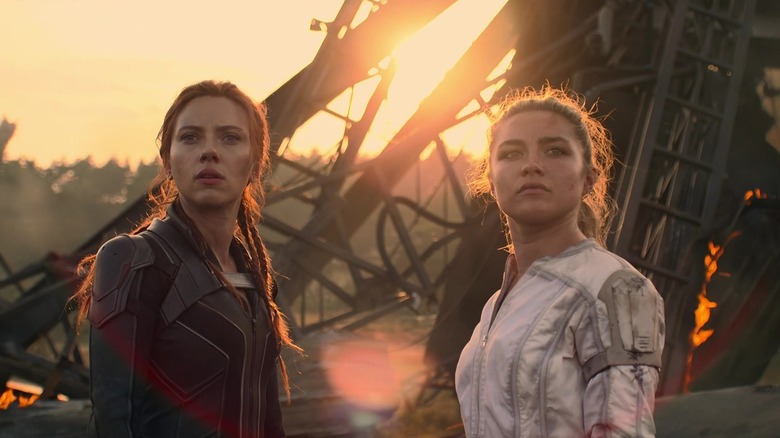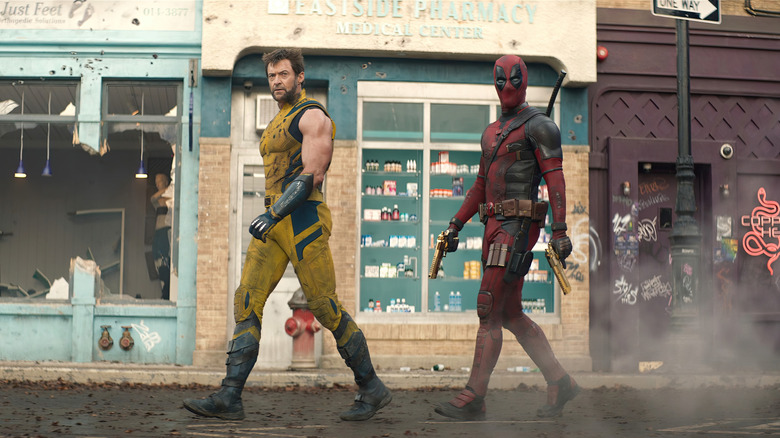The Marvel Cinematic Universe's Current Downfall Can Be Traced Back To One Moment
We may receive a commission on purchases made from links.
From 2008 to 2019, the Marvel Cinematic Universe was the singular blockbuster phenomenon that stood astride Hollywood like a mighty colossus. The property was aggressive and well-moneyed, releasing multiple chapters every year and re-writing traditional cinematic storytelling into a singular broad, interconnected super-narrative. The MCU was essentially a large-scale TV series, with each film serving as a single episode. Thus, after a certain number of "episodes," the show would feature a "season finale," wherein multiple characters from the previous chapters would team up to fight a particularly powerful supervillain. The "seasons" were (and still are) referred to as "phases" and — at least from 2008 to 2019 — the phases would carefully drop hints involving an upcoming threat. Thanos is coming, the Infinity Stones are being introduced, etc.
Fans ate it up. Audiences flocked to MCU movies with open notepads, writing down every possible avenue of potential crossover events. Finally, after 11 years and 22 feature films, everything came to a head with 2019's "Avengers: Endgame," a three-hour crossover action blockbuster that featured 40 characters, time-travel, and the extinction and resurrection of half the universe. It was an event that fans had anticipated for years, and it made for a profitable movie, with "Avengers: Endgame" making almost $2.8 billion at the global box office.
To cool down, Marvel Studios released "Spider-Man: Far From Home" a couple of months after "Endgame," and it served as a kind of "bonus chapter" in the Infinity Saga. We had witnessed the narrative's climax, and it was time to take a rest, breathe, reconnoiter, and begin a new multi-chapter story by introducing some new characters and including some heavy foreshadowing about a new villain to fight.
It was then, however, that COVID hit and theaters closed worldwide. Marvel Studios didn't release another feature film after that until "Black Widow" — which itself took place during the events of the Infinity Saga — came out in July 2021. It was during this closure that the MCU as we knew it kind of fell apart.
Okay, yes, there are still good films and blockbusters in the MCU, but...
This is not to say the MCU hasn't had any hits since 2019. One will immediately note that Jon Watts' 2021 multiverse film "Spider-Man: No Way Home" made $1.9 billion at the box office, while Shawn Levy's 2024 multiverse action-comedy "Deadpool & Wolverine" was another billion-dollar success. The MCU is clearly still capable of making big-time money. I will hasten to point out, though, that these two examples were driven by nostalgia more than anything. Both of them elicited audience excitement by hiring actors from previous Marvel movies and throwing them into the mix. These films feel more like wistful looks back than new steps forward for the MCU. They're easy victory laps fueled by fan service, and their popularity only proves the property is stagnant.
This is also not to say the MCU hasn't been churning out quality films since 2019. I am very fond of the long timeline and psychedelic sci-fi conceits of Chloé Zhao's "Eternals," a movie where ancient super-powered beings have to choose between protecting humanity or, basically, killing their God. I also loved Jake Schreier's "Thunderbolts*," a film about depression and the trauma that superhero-ing inflicts on its practitioners. Likewise, Ryan Coogler's "Black Panther: Wakanda Forever" has amazing sci-fi designs and bizarre undersea kingdoms. Interesting things are still coming out of the MCU.
But surely we can all agree the MCU, as a whole, has lost its momentum since 2019. The sudden interruption of COVID forced the franchise to take a hiatus until 2021, and its slow creep back into theaters — combined with the hit-or-miss track record of its Disney+ shows — hasn't instilled confidence. It's since felt like the MCU has become directionless, causing hype levels to wane. Even the core concept of the ongoing Multiverse Saga hasn't been explored consistently throughout the assorted films and TV series.
Most notably, the MCU hasn't been the same since its cycle of publicity was broken in 2020. And it's since become evident that press releases and a steady release schedule might have been the most vital aspect of the property's success.
COVID revealed the importance of scheduling and press releases to the MCU
2020 was the first year since 2008 that had no MCU releases at all, but that wasn't the original plan. Prior to the pandemic, "Black Widow" was meant to come out in May 2020, with "Eternals" arriving the following November and even more films following suit in 2021. With that release schedule in place, the marketing gurus at Marvel Studios would be permitted to sell their movies with the same velocity, and fans would (in theory) stay amped up, still lost in the swirl.
Indeed, press releases have always been vital to the MCU's success. From 2008 to 2019, fans would be excited about watching one MCU film because they knew it would connect directly to already-announced upcoming chapters. Each Marvel movie basically served as an ad for the next one, and fans remained fully engaged throughout the Infinity Saga.
This changed with COVID. The cycle broke, a year passed, and Marvel Studios rushed to catch up by releasing an avalanche of films and Disney+ shows in 2021. It made each of these projects feel like less of an event, so fans began to detach. Even when the MCU returned to the big screen, it did so amid widespread theater closures, with "Black Widow" being released simultaneously on Disney+ Premier Access. It certainly didn't help that "Black Widow" was a movie about an already-dead character (Scarlett Johansson's namesake famously died in "Endgame") and — this is key — only tangentially set things up for the future. "Far From Home" had already provided a breather. "Black Widow" needed to feel like chapter one in a new book. Instead, it felt like some pages that had fallen out of the last one.
And the new book is still not being written. Over the course of the Multiverse Saga, the MCU has been accumulating, but it hasn't been adding up. When the well-timed press releases lost their timing, the entire property began to crumble. There was no longer a sense of structure, inevitability, or constant, undying hype. And there's no getting it back. It's too late for the MCU.


